Generative AI in eCommerce: Use Cases, Tools, and Strategies
May 22, 2025
Did you know the global eCommerce market is projected to reach $8.1 trillion by 2026? With such explosive growth, businesses are rapidly adopting Generative AI in eCommerce to stay ahead of evolving consumer demands and digital trends. From AI-powered product recommendations to AI-generated product descriptions, generative AI is transforming how customers browse, interact, and purchase across online platforms.
By leveraging Generative AI solutions, eCommerce brands are automating content creation, optimizing personalization at scale, and unlocking new levels of customer engagement. These intelligent systems use models like Large Language Models (LLMs) and Generative Adversarial Networks (GANs) to generate high-quality, context-aware content, from product listings to virtual try-ons.
Let’s explore how the integration of AI tools for eCommerce marketing and AI chatbots for online shopping is shaping the future of digital commerce and helping brands deliver tailored experiences that convert.
Generative AI in eCommerce: Overview
Generative AI in eCommerce refers to the integration of AI models like GPT, DALL•E, and diffusion models to create intelligent, personalized, and scalable content that enhances the digital retail journey.
These technologies are strategically embedded throughout the buyer’s lifecycle, from AI Chatbots in eCommerce for online shopping to generative AI for personalized marketing campaigns.
Benefits of Using Generative AI in eCommerce
Embracing Generative AI in eCommerce is becoming the gold standard for delivering seamless, intelligent, and engaging shopping experiences. Here’s how it’s transforming digital retail:
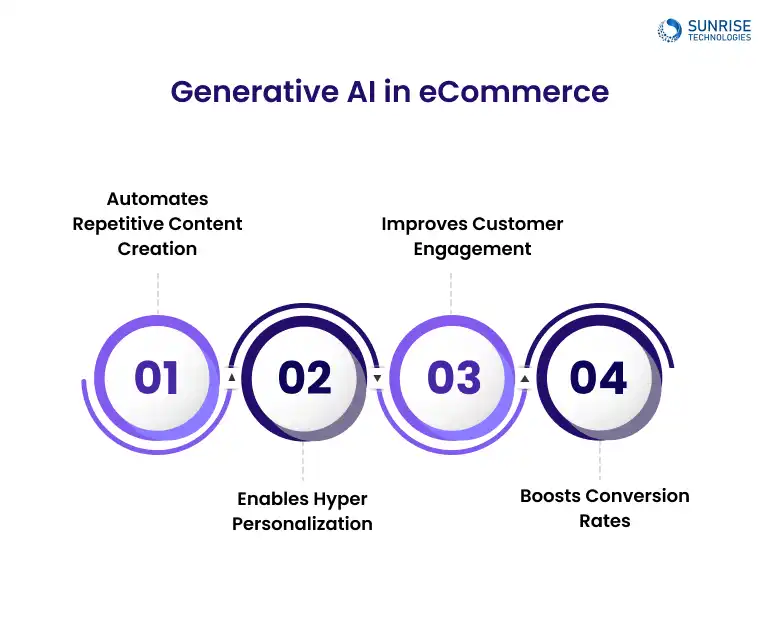
- Generates bulk SEO-friendly product descriptions, FAQs, and metadata using tools like Jasper, CopyMonkey, and ChatGPT.
- Enables faster product launches with consistent, brand-aligned messaging across thousands of SKUs.
- Leverages behavioral data and LLMs to craft tailored content, dynamic offers, and personalized recommendations in real-time.
- Enhances user engagement by delivering content that resonates with individual shopping habits and preferences.
- Deploys AI chatbots and virtual assistants using transformer-based models for 24/7 multilingual support.
- Offers human-like interactions, guiding users through product discovery, FAQs, and post-purchase queries.
- Uses generative models and historical data to forecast buyer intent and recommend next-best actions.
- Drives sales with dynamic pricing, abandoned cart triggers, and personalized promotions based on real-time insights.
Why Generative AI:
As the digital retail space expands, eCommerce platforms face a complex set of challenges that demand intelligent, scalable solutions. Traditional systems struggle to keep pace with the volume, variety, and velocity of data, while customer expectations for personalized and seamless experiences continue to soar. This is where Generative AI becomes a game-changer.
By leveraging Large Language Models (LLMs), Natural Language Processing (NLP), and Generative Adversarial Networks (GANs), generative AI tools bring automation, adaptability, and hyper-personalization into the heart of eCommerce operations. From generating product descriptions to automating customer support, these AI systems can learn, adapt, and evolve with user behavior, solving long-standing bottlenecks across the retail funnel.
Let’s break down the core challenges and how generative AI solutions address them:
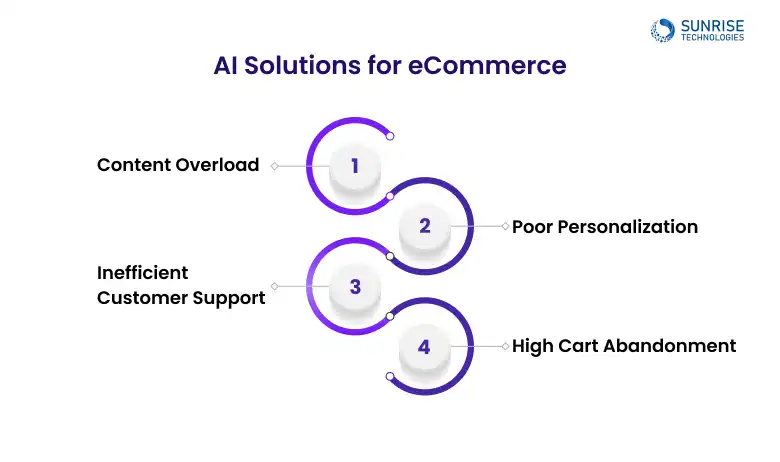
With thousands of SKUs being added or updated regularly, eCommerce platforms require consistent, high-quality, and SEO-optimized content at scale. Manual creation of product descriptions not only drains time and resources but also risks inconsistency across listings. Generative AI, powered by LLMs like GPT-4 or fine-tuned transformers, can automatically generate rich, brand-aligned copy that adheres to tone, structure, and SEO best practices, reducing content bottlenecks.
Problem: Massive manual effort to craft unique descriptions.
Solution: Use best AI tools for generating product descriptions like Jasper and CopyMonkey to automate the process.
Consumers now expect intelligent, individualized experiences. Static recommendation systems lack the dynamic, context-aware logic needed to keep users engaged. Generative AI personalization models use a mix of NLP, collaborative filtering, and real-time behavioral analytics to craft unique product suggestions, messages, and journeys, delivering high-impact experiences that convert.
Problem: Static product suggestions lead to low engagement.
Solution: Deploy strategies for AI-driven personalization in eCommerce using NLP and behavioral data.
Scalability is one of the biggest support challenges during peak shopping seasons. Generative AI enables the development of AI chatbots and voice assistants using transformer-based dialogue models capable of understanding context, sentiment, and intent in multiple languages. This significantly reduces the human workload and ensures round-the-clock assistance, improving CSAT scores and reducing drop-offs.
Problem: Limited human bandwidth during peak hours.
Solution: Implement AI chatbots to enhance online shopping experience, offering 24/7, multilingual support.
With an average cart abandonment rate of over 70%, recovering lost revenue is a top priority. Generative AI integrates with predictive analytics engines and user intent models to deliver smart nudges, real-time discounts, and retargeting messages based on browsing behavior and past interactions. This proactive approach helps in turning hesitations into conversions.
Problem: Shoppers leave without completing purchases.
Solution: Use AI tools for eCommerce marketing like retargeting campaigns, smart nudges, and abandonment triggers.
Let Generative AI be your game-changer.Our experts at Sunrise Technologies are here to build your AI future.
Generative AI Use Cases and Applications in eCommerce
Explore these transformative Generative AI applications in eCommerce that are reshaping how consumers shop and engage online.
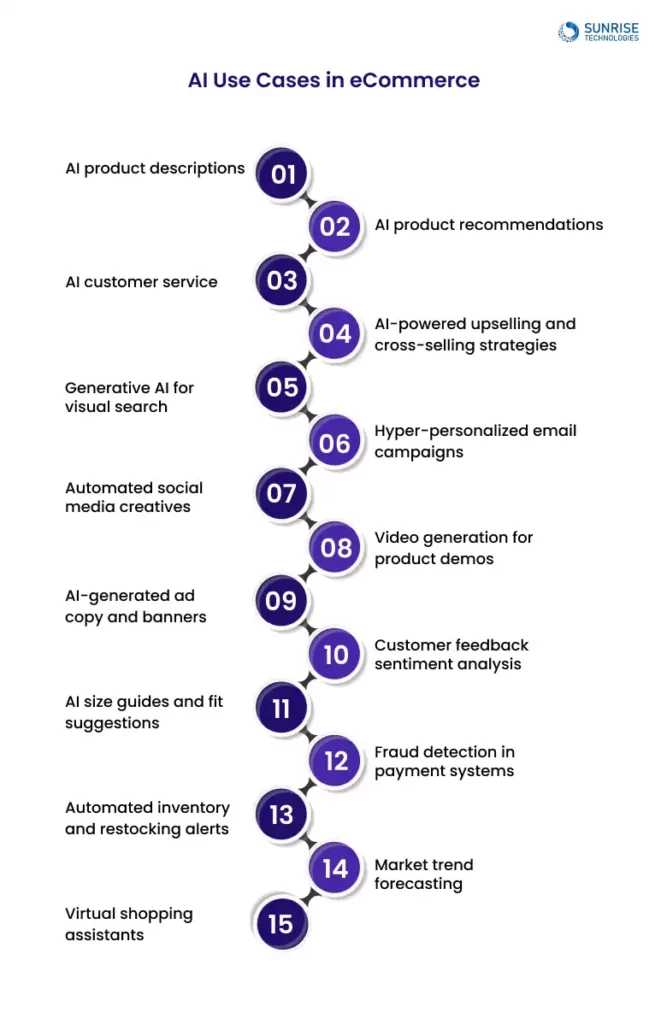
Creating product descriptions at scale can be time-consuming, inconsistent, and SEO-challenging. AI-generated product descriptions for eCommerce automation streamline this process by generating high-quality, optimized content in seconds.
- Enable brand-consistent product content across multiple categories using advanced language models.
- Decrease manual content creation by up to 80% using AI content generation tools like Copy.ai, Jasper, and Writer.
- Ensure consistency in tone and messaging while scaling across global product lines.
- Localize product descriptions across languages automatically to improve global accessibility.
Personalization is the cornerstone of customer retention, and AI-powered product recommendations for online shoppers allow retailers to deliver dynamic, relevant product suggestions that drive conversions and improve AOV (Average Order Value).
- Use AI recommendation engines to analyze past purchases, browsing behavior, and search history.
- Dynamically present upsells and cross-sells using real-time predictive analytics to maximize purchase potential.
- Leverage collaborative filtering and deep learning models to enhance recommendation precision.
- Continuously refine recommendations using A/B testing and feedback loops to optimize effectiveness.
Customer expectations for fast and effective support are rising. AI-driven customer service for seamless support uses generative AI chatbots and NLU to offer intelligent and scalable AI-driven customer journey.
- Deploy AI chatbots trained with NLU to automate FAQs, order tracking, and return requests.
- Provide multilingual, 24/7 support to boost customer satisfaction and reduce churn.
- Integrate bots with CRM tools for a personalized support experience.
- Use sentiment analysis to escalate complex queries to human agents with context.
Increasing revenue per customer is critical. AI-powered upselling and cross-selling strategies in eCommerce use predictive intelligence to suggest complementary and premium products.
- Use Generative AI in cross-sell algorithms to bundle items based on buying intent.
- Trigger time-sensitive promotions based on cart activity and user behavior.
- Recommend higher-tiered alternatives using customer preferences and price elasticity.
- Employ contextual nudges through email, in-app, or checkout flows.
- Implement computer vision models to recognize items and map them to inventory.
- Auto-generate visual product tags and attributes using generative image captioning.
- Enhance product discoverability by matching user-uploaded photos with catalog items.
- Integrate AR for real-time try-before-you-buy experiences.
Email marketing remains one of the highest ROI-generating channels. Hyper-personalized email campaigns using Generative AI leverage customer data to craft dynamic, engaging emails that feel uniquely tailored to each user.
- Use AI-powered segmentation to group audiences based on behavior, purchase history, and preferences.
- Automatically generate subject lines, CTAs, and email content using LLMs trained for ecommerce tone.
- Schedule optimized send times using AI-based engagement predictions.
- Increase open and click-through rates with real-time personalization based on intent.
Maintaining a social media presence requires constant content flow. Automated social media creatives using generative design streamline the design process by creating platform-ready visuals and captions in minutes.
- Generate branded image templates and banners using AI design tools like Canva AI or Adobe Firefly.
- Create seasonal and promotional posts automatically based on product feeds.
- Use generative copy models to auto-write hashtags and captions optimized for engagement.
- Reduce marketing costs while maintaining creative freshness across platforms.
Videos significantly enhance product understanding and conversion. Video generation for product demos using Generative AI allows ecommerce brands to auto-generate short, engaging videos from product descriptions or images.
- Convert product specs and images into dynamic demo videos with voiceovers.
- Personalize video content for different buyer personas or geographies.
- Leverage tools like Synthesia or Pictory to scale video content across catalogs.
- Integrate videos into product pages, emails, and social channels to boost engagement.
Ad fatigue and creative testing slow down campaign performance. AI-generated ad copy and banners for eCommerce marketing enable rapid iteration of engaging, tailored creatives for ad platforms.
- Use LLMs to create compelling headlines, CTAs, and ad body text.
- Generate banner variations optimized for Google Ads, Meta, or Pinterest specs.
- A/B test creatives in real time and let AI optimize winners.
- Maintain consistent brand messaging while personalizing ads for audience segments.
Understanding customer sentiment helps businesses improve products and service. Customer feedback sentiment analysis using AI uses NLP models to interpret reviews, surveys, and social comments at scale.
- Identify common themes in positive and negative feedback using clustering algorithms.
- Trigger product updates or service responses based on sentiment trends.
- Segment feedback by demographic or geographic data for deeper insights.
- Automate sentiment tagging for faster decision-making.
Fit uncertainty is a major reason for returns. AI-generated size guides and fit suggestions in eCommerce help customers find the right size based on body type, style preference, and past purchases.
- Recommend fit based on AI analysis of return patterns and user input.
- Use ML to compare product sizing with historical data from similar brands.
- Offer interactive fit visualizations or AR try-on options.
- Reduce return rates and increase buyer confidence.
Digital transactions are prone to fraud, affecting revenue and trust. Fraud detection in payment systems using AI leverages behavioral analytics and anomaly detection to secure eCommerce transactions.
- Detect abnormal transaction patterns in real time using machine learning.
- Cross-verify data points like IP address, device fingerprint, and payment history.
- Automate fraud alerts and dynamic transaction approvals.
- Reduce false positives while enhancing payment security.
Managing stock efficiently is key to eCommerce profitability. Automated inventory and restocking alerts using Generative AI ensure retailers avoid both overstocking and stockouts.
- Use predictive models to forecast demand based on historical data and trends.
- Auto-generate restocking alerts when inventory thresholds are met.
- Integrate with supply chain tools for end-to-end replenishment automation.
- Visualize stock health using AI-powered dashboards.
Staying ahead of market shifts requires smart forecasting. Generative AI for market trend forecasting in eCommerce uses predictive analytics and NLP to track evolving consumer preferences.
- Scrape and analyze web and social data to detect emerging trends.
- Generate product ideas based on AI-predicted demand surges.
- Guide merchandising, marketing, and pricing strategies with AI forecasts.
- Identify seasonal spikes and prepare campaigns in advance.
Conversational commerce is rising. Virtual shopping assistants with natural language understanding offer interactive, AI-guided shopping experiences that mimic in-store help.
- Use advanced NLU models like GPT to interpret customer queries.
- Recommend products, guide checkout, or answer questions in real time.
- Personalize shopping journeys based on intent and purchase behavior.
- Enhance accessibility with voice-enabled shopping features.
Technologies Behind Generative AI in eCommerce
To harness the power of Generative AI in eCommerce, platforms employ cutting-edge technologies that enable advanced features like personalization, automation, and content generation. Here’s a breakdown of the key technologies driving innovation in the digital retail space:
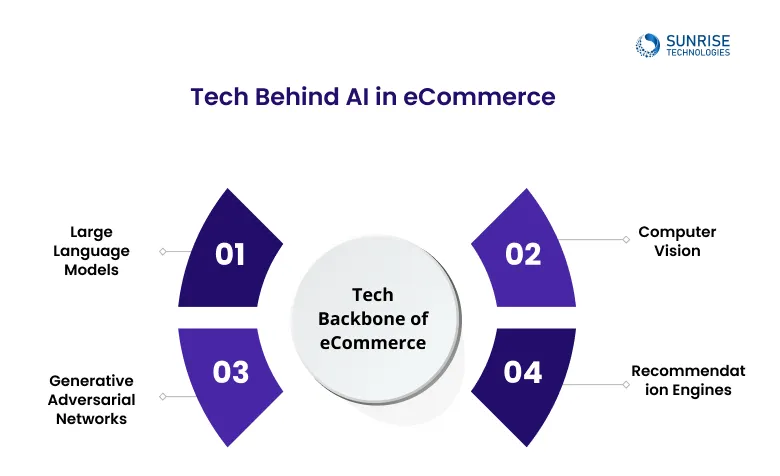
Large Language Models (LLMs), such as GPT-4, Claude, and Gemini, are at the core of natural language generation (NLG) applications in eCommerce. These models allow platforms to generate product descriptions, blog posts, customer emails, and more with human-like fluency.
- Natural Language Generation: LLMs create SEO-friendly product descriptions and social media posts at scale.
- Personalized Communication: Automate personalized emails and chatbot interactions to boost engagement.
- Contextual Understanding: LLMs grasp user intent to produce more relevant content.
Computer vision plays a vital role in visual search and smart recommendations for eCommerce platforms. Leveraging technologies like image recognition and augmented reality, computer vision allows businesses to enhance the visual shopping experience for customers.
- Visual Search: Customers upload images to instantly find similar or matching products.
- Style Transfers: Display products in different contexts to help customers visualize real-life usage.
- Automatic Image Tagging: AI tags products with relevant keywords for quicker, more efficient searches.
Generative Adversarial Networks (GANs) are powerful tools used to create lifelike product images, perform style transfers, and even generate new product designs. GANs consist of two neural networks, the generator and the discriminator—working in opposition to create highly realistic content.
- Image Synthesis: GANs generate realistic product images from scratch for virtual catalogs.
- Style Transfer: Apply unique aesthetics to product images for varied brand presentations.
- Fashion & Apparel: GANs create new fashion designs by learning from existing data and generating variations.
GANs are particularly useful for eCommerce platforms that require high-quality visuals or need to continuously update their product catalogs without requiring photoshoots.
Recommendation engines powered by collaborative filtering and deep learning are the backbone of AI-powered product recommendations. These algorithms analyze customer behavior, such as past purchases, browsing patterns, and preferences, to make accurate, personalized suggestions.
- Collaborative Filtering: Recommends products based on similar user behavior.
- Deep Learning: Enhances recommendations by analyzing complex user data for more accurate suggestions.
- Upselling & Cross-selling: AI recommends related or premium products, boosting AOV and revenue.
Real World Use Cases for Generative AI in eCommerce
Amazon, the world’s largest eCommerce platform, uses Generative AI to enhance product discovery and recommendations, creating a seamless, personalized shopping experience for millions of customers worldwide.
AI Model Focus: Personalized product recommendations based on user behavior and preferences.
Technologies Used: Machine Learning (ML), Collaborative Filtering, Deep Learning, NLP.
Amazon’s AI-powered recommendation engine analyzes vast amounts of user data (including browsing history, purchase behavior, and demographics) to suggest personalized products, ensuring customers find what they’re looking for faster. The deep learning algorithms constantly improve, learning from user interactions to make real-time suggestions. With collaborative filtering, the system also takes into account the preferences of similar customers, refining its recommendations. This tailored approach boosts engagement, increases Average Order Value (AOV), and enhances customer satisfaction.
Alibaba, a global leader in eCommerce, uses Generative AI to automate the creation of millions of product descriptions, enabling efficient content management for its massive inventory.
AI Model Focus: Automated content generation for product descriptions at scale.
Technologies Used: Large Language Models (LLMs), Natural Language Generation (NLG), SEO optimization algorithms.
Alibaba uses Generative AI to generate SEO-optimized, human-like product descriptions for its extensive catalog. The system can create content in multiple languages, ensuring accuracy and consistency while adhering to SEO best practices. It leverages NLP techniques to understand product features and benefits, creating descriptions that resonate with customers and improve organic search visibility. This approach allows Alibaba to scale content creation without sacrificing quality, driving more traffic to product listings.
H&M, a global leader in fashion retail, uses Generative AI to provide personalized product recommendations, improving the customer shopping experience by tailoring options to individual tastes and preferences.
AI Model Focus: Personalized fashion recommendations based on customer data and preferences.
Technologies Used: Machine Learning (ML), Deep Learning, Natural Language Processing (NLP), Recommendation Algorithms.
H&M integrates AI-powered recommendation engines that analyze customer purchase history, browsing behavior, and fashion preferences to suggest personalized outfits and accessories. By using deep learning algorithms and NLP, the platform tailors recommendations and offers exclusive collections, even suggesting Hand-M products for those seeking unique, artisan styles. This technology not only enhances customer satisfaction but also drives conversions by increasing the likelihood of customers finding products that match their personal style.
Sephora, a leading beauty retailer, utilizes Generative AI in the form of an intelligent virtual assistant that provides personalized product recommendations and customer support through natural language processing.
AI Model Focus: Conversational AI for virtual customer assistance and personalized product suggestions.
Technologies Used: Natural Language Processing (NLP), Machine Learning (ML), Voice Recognition, Chatbot Technologies.
Sephora’s AI-driven virtual assistant engages customers with personalized beauty advice, helping them discover products based on their preferences, skin type, and other criteria. The assistant uses NLP to understand and respond to customer inquiries, offering tailored recommendations and even guiding users through purchase decisions. By automating customer support, Sephora improves customer service efficiency while enhancing engagement. The assistant can provide 24/7 service, improving customer satisfaction and reducing the workload on human agents.
And so do we, at Sunrise Technologies.Your vision + our AI expertise = retail innovation.
Development Costs for Generative AI in eCommerce
| Project Type | Cost | Features |
|---|---|---|
| Basic | $10,000 – $15,000 |
– Basic product description generation – Simple recommendation systems – Limited data integration |
| Mid-Range | $25,000 – $50,000 |
– Personalized recommendations – AI-driven customer support chatbots – Advanced data integration – Optimized for small to medium-sized catalogs |
| Enterprise | $50,000 + |
– Advanced personalized experiences – Real-time inventory management – Large-scale customer behavior analysis – Integration with multiple platforms and APIs |
– Simple recommendation systems
– Limited data integration
– AI-driven customer support chatbots
– Advanced data integration
– Optimized for small to medium-sized catalogs
– Real-time inventory management
– Large-scale customer behavior analysis
– Integration with multiple platforms and APIs
Future of Generative AI in eCommerce
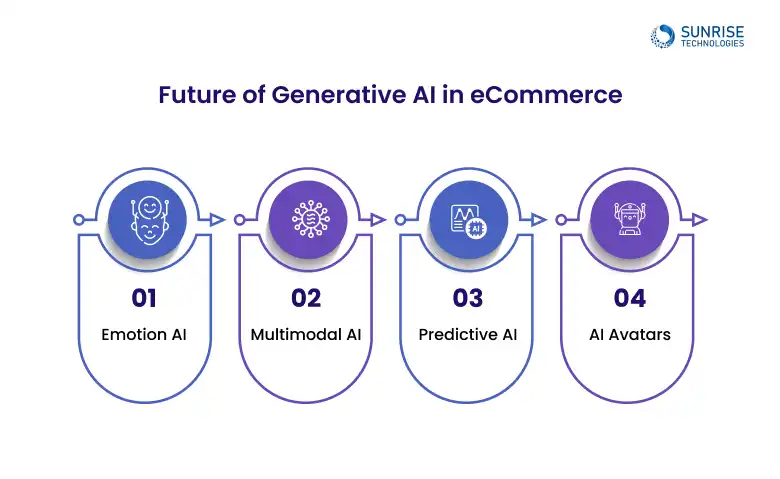
- Emotion AI Shops that feel you, literally! Emotion AI reads your mood and personalizes the experience in real-time.
- Multimodal AI Talk, type, or show, multimodal AI blends voice, text, and images for smoother, smarter interactions.
- Predictive AI Know what customers want before they do. Predictive AI makes forecasting product demand a breeze.
- AI Avatars Meet your virtual shopping buddy, AI avatars that guide, suggest, and style you like a pro.
How Sunrise Technologies Helps You Implement Generative AI in eCommerce
At Sunrise Technologies,we architect the future of eCommerce through custom Generative AI solutions. As a leading Generative AI development company, we specialize in delivering intelligent, scalable, and business-ready AI experiences that redefine how online retail operates.
From personalized product discovery to automated content generation, our solutions are built to elevate user engagement, drive conversions, and streamline your entire digital retail journey.
Why Partner with Sunrise Technologies?
As your trusted Generative AI consulting company, we bring a full suite of technical capabilities and domain expertise to help you thrive in the AI-powered commerce era.
- Deep Expertise Our team leverages advanced machine learning models and Generative AI frameworks to craft experiences that dynamically adapt to each user’s preferences, behavior, and emotional context.
- Full-Cycle Generative AI App Development From ideation and strategy to AI app development, deployment, and scaling, we provide end-to-end development support. .
- AI Chatbots for Online Shopping & Customer Support We build intelligent, conversational AI chatbots and virtual shopping assistants using large language models (LLMs) and NLP, delivering real-time assistance, product recommendations, and a seamless buyer journey.
- Seamless Integration Our AI integrations are designed for frictionless performance across platforms like Shopify, Magento, WooCommerce, and custom-built solutions, ensuring your AI systems blend smoothly with your existing ecosystem.
- AI-Driven Content & Marketing Automation Using Generative AI tools, we help you automate product descriptions, social media content, and targeted marketing campaigns, significantly reducing manual effort while boosting consistency and relevance.
Generative AI in eCommerce is foundational for AI-generated product descriptions to emotion-aware personalization, and predictive analytics, The retail landscape is being transformed by intelligent automation.
As a top-tier AI app development company with a focus on retail innovation, Sunrise Technologies is here to guide you through this shift. Tap into our Generative AI consulting development services to unlock new levels of efficiency, engagement, and growth.
It’s already here, and we can build it for you. Sunrise Technologies leads the way in Generative AI development.
Tools like Jasper, CopyMonkey, Writesonic, and ChatGPT are top AI tools for eCommerce marketing and copywriting.
Use platforms like Dialogflow, IBM Watson, or Botpress and integrate with your CMS and CRM.
Use LLMs and recommendation engines to analyze customer behavior and generate suggestions dynamically.
Always evaluate whether the firm offers AI strategy consulting services and ongoing support post-deployment. To select the right firm, consider:
Combine browsing data, purchase history, and NLP models for tailored UX, email content, and support.
Sam is a chartered professional engineer with over 15 years of extensive experience in the software technology space. Over the years, Sam has held the position of Chief Technology Consultant for tech companies both in Australia and abroad before establishing his own software consulting firm in Sydney, Australia. In his current role, he manages a large team of developers and engineers across Australia and internationally, dedicated to delivering the best in software technology.



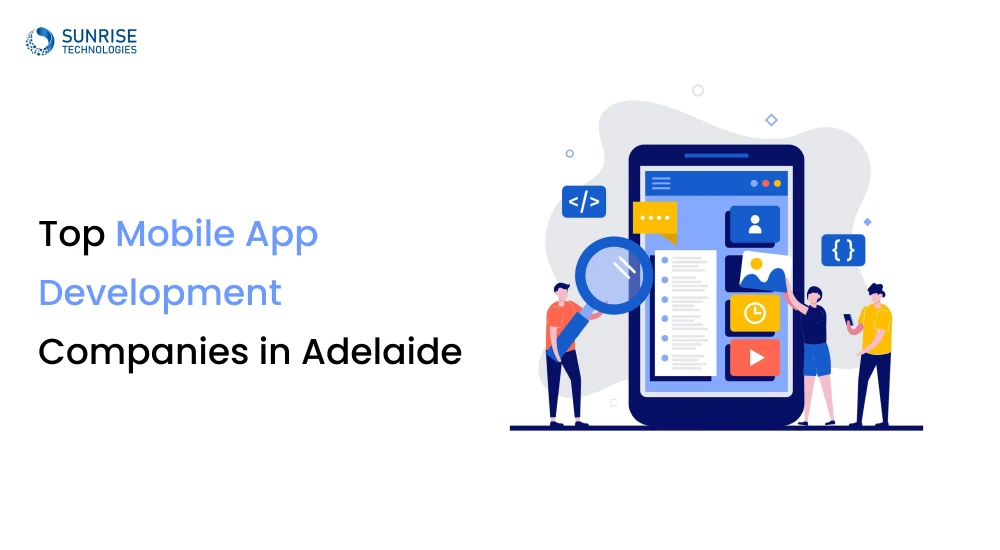

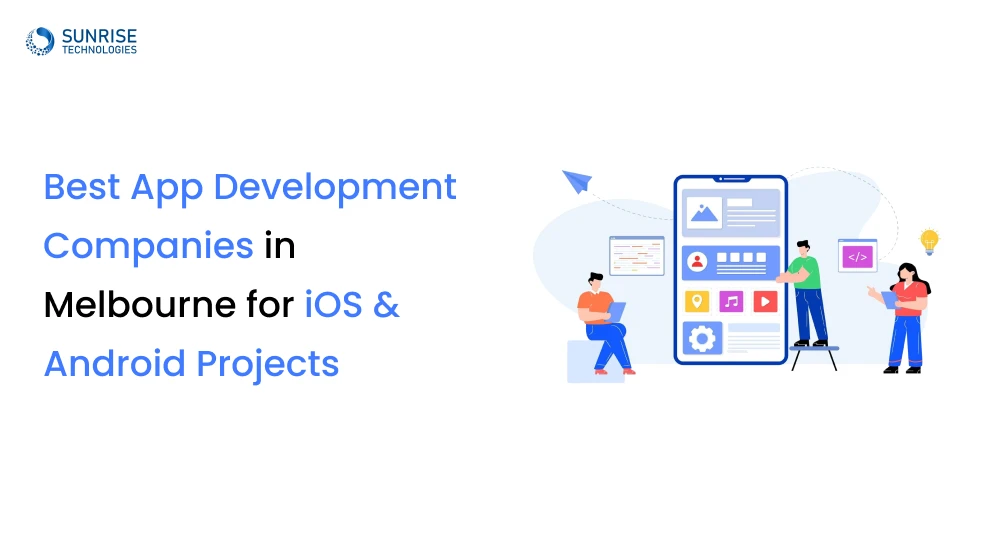
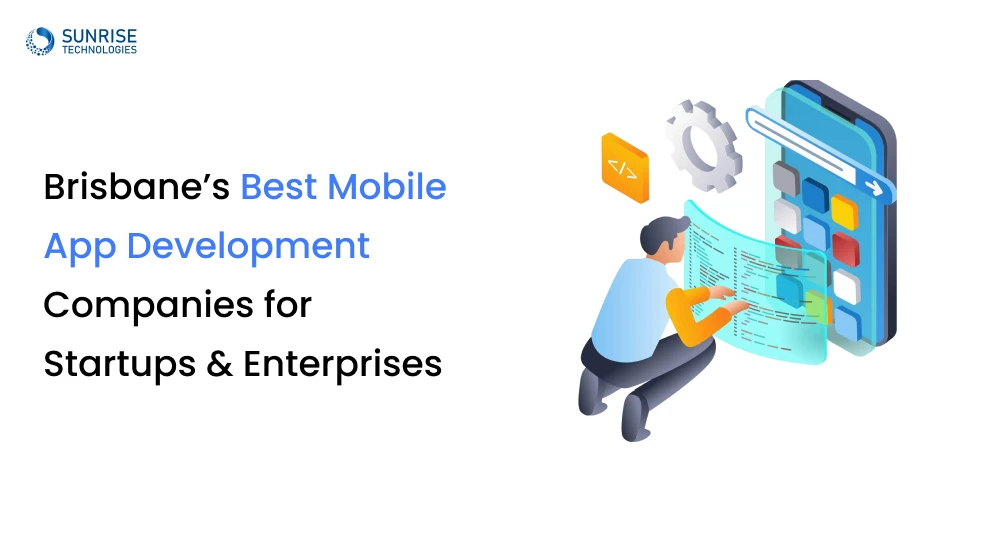
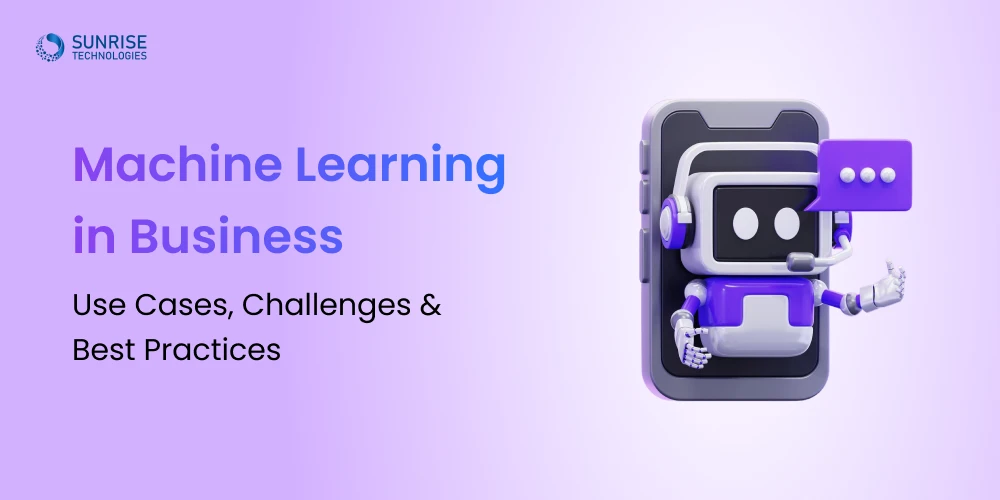

Cloud Based Project Management Platform
Read the challenges we faced and how we helped
View Case Study












